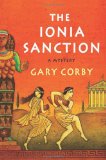by Gary Corby
Minotaur Books, New York, 2011. 335 pages.
Starred Review
Here’s a second mystery set during the dawn of democracy in Athens. In this one, our hero Nicolaos is sent to Ephesus in Ionia to retrieve a letter stolen from a murdered man.
This book also begins with a dead body. The first line is still pretty striking:
“I ran my finger along one foot of the corpse, then the other, making the body swing with a lazy, uncaring rhythm.”
The proxenos for Ephesus in Athens (kind of the opposite of an ambassador; an Athenian with an interest in Ephesus who handles Ephesian business) has been murdered. A letter he received from Ephesus has been stolen. Nico has to go to Ephesus with a mission to find out what was in the letter. The murdered man’s son would like his father cleared of treason while Nico’s at it. And the woman he loves, Diotima, is now a priestess at the Artemsion in Ephesus.
This is no cozy armchair mystery. There are some gritty details and some sexual misadventures, but they do seem to reflect life in that time period. I had known, for example, that impalement was used to kill people, but I’d never before understood what a truly horrible form of death it was. The author explains in his note at the end that crucifixion was introduced later as a more humane alternative to impalement.
Nicolaos travels to Ephesus and Magnesia, where he meets the famed hero of Athens, Themistocles, who was later exiled as a traitor and now enjoys the favor of the Great King of Persia. There’s another death, and Nico has to figure out how they all tie together, as well as fulfill his commission from Pericles in Athens.
The mystery is the sort where you don’t necessarily have the clues to solve the case yourself, but you do enjoy the adventure of watching Nicolaos come to the solution, with lots of help from Diotima.
All in all, despite some moments that made me wince, this book gives a fun story, an adventure with lots of historical details and a strong dose of humor. Nicolaos is something of a bumbler. The more pleased he is with himself, the more confident he is, the more you can be sure he’s going to fail.
Since Nico’s visiting Persia, he naturally looks at their lives with the eyes of an Athenian. This makes an entertaining way of telling the reader the things that were normal in Athens. For example, one character convinces Nico that wearing trousers is a more comfortable way to ride a horse.
Reading the extended author’s note at the end of the book made me all the more impressed with it. Based on the historical record, everything in this book could actually have happened. As in the first book, The Pericles Commission, the list of characters at the front highlights people who are actual historical figures, about half of the list. My favorite, of course, is still Nicolaos’ annoying little brother, Socrates, though he only shows up at the start of this book.
If you read these books, you’ll never think of ancient history the same way again. The Athenian proxenos for Ephesus is murdered. Nicolaos goes to Ephesus to investigate. Highjinks ensue. Now I know what really happened.
Find this review on Sonderbooks at: www.sonderbooks.com/Fiction/ionia_sanction.html
Disclosure: I am an Amazon Affiliate, and will earn a small percentage if you order a book on Amazon after clicking through from my site.
Source: This review is based on a library book from the Fairfax County Public Library.
